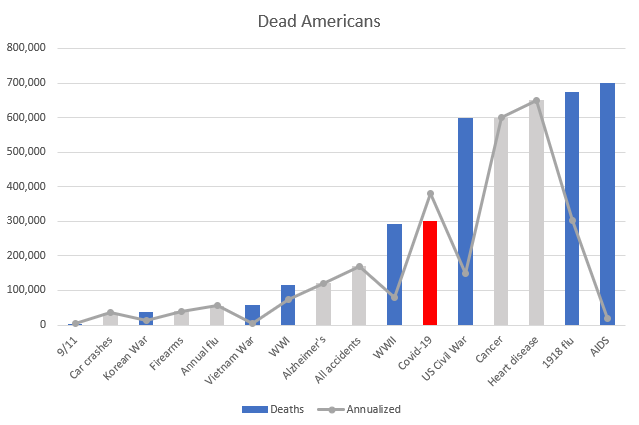Happy Hanukkah! Now read these:
I will now have some very yummy Szechuan leftovers.
I posted a table about a week ago showing the number of American deaths per day from various disasters that we've had over our history. I did a bit more research, and we've had a lot more Covid-19 deaths, so I've updated the table:
- Average daily deaths from 1918 flu, October 1918: 6,290
- Galveston hurricane, 9 Sep 1900: ~6,000
- Battle of Antietam, 18 Sep 1862: 3,652
- Covid-19, 9 Dec 2020: 3,411
- Puerto Rico hurricane, 7 Aug 1899: 3,389
- Covid-19, 6 Apr 2020: 3,156
- San Francisco Earthquake, 18 Apr 1906: ~3,100
- Covid-19, 11 Dec 2020: 3,013
- Terrorist attacks, 11 Sep 2001: 2,996
- Covid-19, 3 Dec 2020: 2,861
Pearl Harbor, formerly 8th on this list, has dropped to 19th.
I also corrected the durations and total counts for this chart, which I've posted a few times. Note that Covid-19 is even more clearly the most deadly disaster in American history on an annualized basis, and the third worst catastrophe after our annual heart disease and cancer mortality:

And to think, if we'd had (a) leadership and (b) a more mature populace, we might have prevented most of those deaths.
The Electoral College has voted, and with no surprises, as of 16:37 Chicago time Joe Biden has received the requisite 270 votes to be elected President of the United States. And yet, we had a few surprises today:
Finally, John le Carré died at 89 yesterday. Time to revisit Josephine Livingstone's review of "the glorious return of George Smiley," le Carré's 2017 novel A Legacy of Spies.
I'm not good at it, personally. But NBC News has some advice they've titled "How to talk to your friends and family about Covid, vaccines and wearing masks:"
“You always want to offer your empathy first,” said Amy Pisani, executive director of Vaccinate Your Family, the nation’s largest nonprofit organization dedicated to vaccine advocacy. “If they have a personal story, start with your shared values.”
Steven Taylor, a clinical psychologist and professor at the University of British Columbia in Vancouver, Canada, said that confrontation is particularly doomed to failure when talking to people who have fallen down conspiracy rabbit holes.
“Many conspiracy theorists score high in a trait called psychological reactance, which, to put it simply, is like an allergic reaction to being told what to do,” Taylor said. “We have to think of messages that don’t trigger that psychological reactance.”
Rather, it may be more effective to find non-confrontational ways to appeal to people that don’t overtly challenge their sense of self or freedom — a concept that Taylor refers to as introducing “behavioral nudges.” Instead of harping on the scientifically proven benefits of wearing a mask, for instance, people could try to convince friends and family to don face coverings for the good of their community.
Sander van der Linden, a social psychologist at the University of Cambridge in the U.K., said the emergence of conspiracy theories in times of upheaval has been well-documented throughout history.
“What you often see is that in times of uncertainty — whether it’s political uncertainty, economic uncertainty or social uncertainty — there’s a surge in conspiracy theories,” van der Linden said.
And that’s cause for real concern. Van der Linden’s research has shown that people who believe misinformation about the coronavirus are less likely to wear masks or get vaccinated, which makes it critical at this juncture of the pandemic to try to engage, rather than ignore, skeptical loved ones.
In times of extreme stress, we become apes, in other words. Yet somehow, we'll get through this.
My company gives us the usual American holidays off, and adds two "floating holidays" you can take whenever you want. I took my first one in January and just remembered last week that I hadn't taken the second one. So I took it today. Which gave me some time to read a bunch of things:
Finally, the list I posted Wednesday needs an update. In October 1918, influenza killed 195,000 Americans, or an average of 6,290 per day. So clearly most of that month set records well above the records we set this week.
The city's plan would vaccinate every adult who lives or works in Chicago in 2021:
Initial vaccine doses will be sent to all 34 hospitals in Chicago, city officials said. Health care workers who treat COVID-19 patients or are at high risk for coronavirus spread will be first to receive it, city officials said.
After health care workers, vaccines will be prioritized for a broad group of people including residents and staff at long-term care facilities, individuals at high risk due to underlying medical conditions, people who are 65 and older, and workers in “essential and critical industries.”
Much of the situation remains in flux, officials said, but the city is working through its plans while awaiting federal guidance and vaccines. As the vaccine becomes more widely available, the city will rely on providers including doctors’ offices, pharmacies, federally qualified health centers and hospitals to help distribute doses.
To help ensure equitable access for Chicago residents, the city also will be using centralized sites such as some City Colleges as mass vaccination sites aimed at health care workers who aren’t based in hospitals, [public health Commissioner Dr. Allison] Arwady said.
Vaccines won’t be mandatory for residents, Arwady said, but as the vaccine rolls out further, she anticipates that some industries such as airlines might begin requiring customers to get vaccinated. She said the city will also be encouraging residents to get vaccinated.
“My goal is to really have done the work to build some of that trust so that this is something that people are feeling excited about as opposed to being a major point of discussion,” she said.
We're finally seeing a light at the end of the tunnel. But if people keep behaving like spoiled children, we'll all have trouble getting to it.
I saw a slightly-inaccurate version of this on Facebook and corrected it.
Here's a list of the most single day, single cause deaths in American history, through yesterday today. See if you can spot the pattern:
- Galveston hurricane, 9 Sep 1900 (~6,000)
- Battle of Antietam, 18 Sep 1862 (3,652)
- Puerto Rico hurricane, 7 Aug 1899 (3,389)
- SF earthquake, 18 Apr 1906 (~3,100)
- Covid-19, 9 Dec 2020 (3,011)
- Terrorist attacks, 11 Sep 2001 (2,996)
- Covid-19, 3 Dec 2020 (2,861)
- Okeechobee hurricane, 17 Sep 1928 (~2,800)
- Covid-19, 2 Dec 2020 (2,762)
- Covid-19, 8 Dec 2020 (2,566)
- Pearl Harbor, 7 Dec 1941 (2,467)
- Covid-19, 1 Dec 2020 (2,461)
- Covid-19, 4 Dec 2020 (2,439)
- Covid-19, 5 Dec 2020 (2,310)
More important is that the only disaster to kill more Americans on an annualized basis than Covid-19 is the 1918-1919 flu, and it's a very close number (about 300,000 deaths per year attributable to each). As the winter goes on and Covid-19 deaths increase, I expect it will surpass the 1918 flu on that basis.
But no disaster has killed more Americans than HIV/AIDS, except smallpox, depending on when you start counting.
Data from CDC.
Today's news stories comprise a mixed bag:
Finally, a little sweetness for a cold December day: Whisky Advocate has a recipe for bourbon balls that I hope someone will try and share with me. I'll even supply the bourbon.
Just reviewing what I actually got up to yesterday, I'm surprised that I didn't post anything. I'm not surprised, however, that all of these articles piled up for me to read today:
- Dunn County, Wis., Democratic Party chair Bill Hogseth, writing in Politico, explains "why Democrats keep losing rural counties" like his.
- Ross Douthat asks, "why do so many Americans think the election was stolen?"
- Author Ben Judah explains why The Crown's portrayal of Prince Charles is wrong.
- The STBX administration's salted-earth activities include making the US citizenship test more political.
- The Federal Court for the District of Hawaii sentenced the corrupt former Honolulu police chief and his equally-corrupt ex-wife to prison for conspiracy, bank fraud, and other charges.
- The National Academy of Sciences has determined that a directed-microwave weapon sickened US diplomats in Havana, Cuba, but did not examine who fired it.
- Covid-19 has given us a whole new dictionary of workplace slang, according to 1843.
- The New Yorker's Alex Ross finds the moral closure of the 2004 film Downfall a little too facile.
- Divers in the Baltic Sea have found an Enigma coding device from May 1945.
- Though difficult to see from Chicago, a conjunction between Jupiter and Saturn will cause a rare double-planet effect this month, peaking when the planets are 6 arc-minutes apart on December 21st.
While I'm reading all of that, I've got a stew going in my Instant Pot (on slow-cooker mode). Unfortunately, it seems I underestimated the bulkiness of stew ingredients. I think I'll have a lot of leftovers:

Today, for the first time, the United States had more deaths from Covid-19 in a single day (3,100) than the total number of deaths from the September 11th terror attacks (2,996).
To understand how this happened, one need only look at Iowa:
To visit Iowa right now is to travel back in time to the early days of the coronavirus pandemic in places such as New York City and Lombardy and Seattle, when the horror was fresh and the sirens never stopped. Sick people are filling up ICUs across the state. Health-care workers like Klein are being pushed to their physical and emotional limits. On the TV in my parents’ house in Burlington, hospital CEOs are begging Iowans to hunker down and please, for the love of God, wear a mask. This sense of new urgency is strange, though, because the pandemic isn’t in its early days. The virus has been raging for eight months in this country; Iowa just hasn’t been acting like it.
The story of the coronavirus in this state is one of government inaction in the name of freedom and personal responsibility. Iowa Governor Kim Reynolds has followed President Donald Trump’s lead in downplaying the virus’s seriousness. She never imposed a full stay-at-home order for the state and allowed bars and restaurants to open much earlier than in other places. She imposed a mask mandate for the first time this month—one that health-care professionals consider comically ineffectual—and has questioned the science behind wearing masks at all. Through the month of November, Iowa vacillated between 1,700 and 5,500 cases every day. This week, the state’s test-positivity rate reached 50 percent. Iowa is what happens when a government does basically nothing to stop the spread of a deadly virus.
South Dakota, Idaho, Kansas, Iowa, and Oregon all have positivity rates over 40% today. It's so bad in South Dakota that the Cheyenne River Sioux Chief likened it to being trapped in a house on fire. Illinois is at 10.6%, high enough that state, county, and city authorities have slammed on the brakes again and started talking seriously about mask mandates. States in the northeast that locked down early and hard and stayed that way, like New York and Massachusetts, have rates under 5%. If only there were some relationship in the data we could find...hmm...
I wonder what people sent to Hong Kong jails for merely advocating in favor of democracy think about Republicans' attitudes towards "freedom and personal responsibility." Maybe we should send some Republicans to Hong Kong to find out.